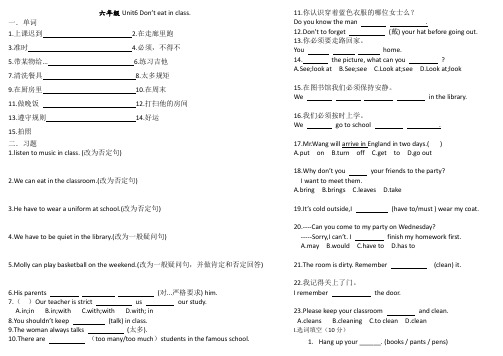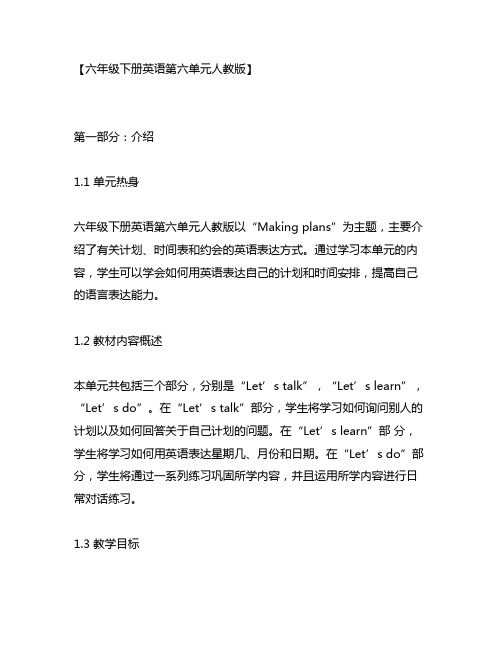小学六年级英语下册第六单元导学案2
第六单元导学案

Unit 6 I’m more outgoing than my sister导学案主备:魏桂芳审核:时间:Section A 1a-2c学习目标1掌握四会单词outgoing twin calm serious, athletic note mean2掌握形容词比较级的变化规则。
.Practising: 运用比较级,谈论人物的个性特征。
【Important points】比较级的变化规则及谈论两人的不同【Learning process】一、学习提纲一预习检测Task 1. 形容词比较级的变化规则1、写出下列词的反意词:tall _______thin_______long______ calm______old________good______ 2、掌握形容词比较级的变化规则:把下列符合要求的单词对号入坐:thin long calm funny quiet serious outgoing smart athleticshort big heavy early interesting beautiful wild1、在词尾直接加er: taller _________________2、以字母e结尾的单词,直接加r: later finer nicer __________________3、双写最后一个辅音字母,加er: bigger _________________4、辅音字母加y结尾的单词,变y为i加er: easier _____________5、多音节词和部分双音节词,在词前加more:_______________more beautiful6、不规则变化词:many/more good little ___________________二、学习提纲二谈论人物的个性特征1、记忆并练习下列对话:—Is that Tara?/That is Tara,isn't it?—No, it isn't. It's Tina. Tara's shorter than Tina.①、对两人进行外貌、性格的比较,应用:形容词比较级+than例:我比我妹妹高。
鲁教六年级下册第六单元导学案

六年级Unit6 Don’t eat in class.一.单词1.上课迟到2.在走廊里跑3.准时4.必须,不得不5.带某物给...6.练习吉他7.清洗餐具8.太多规矩9.在厨房里10.在周末11.做晚饭12.打扫他的房间13.遵守规则14.好运15.拍照二.习题1.listen to music in class. (改为否定句)2.We can eat in the classroom.(改为否定句)3.He have to wear a uniform at school.(改为否定句)4.We have to be quiet in the library.(改为一般疑问句)5.Molly can play basketball on the weekend.(改为一般疑问句,并做肯定和否定回答)6.His parents (对...严格要求) him.7.()Our teacher is strict us our study.A.in;inB.in;withC.with;withD.with; in8.You shouldn’t keep (talk) in class.9.The woman always talks (太多). 10.There are (too many/too much)students in the famous school.11.你认识穿着蓝色衣服的哪位女士么?Do you know the man .12.Don’t to forget (戴) your hat before going out.13.你必须要走路回家。
You home.14. the picture, what can you ?A.See;look atB.See;seeC.Look at;seeD.Look at;look15.在图书馆我们必须保持安静。
We in the library.16.我们必须按时上学。
六年级下册英语导学案-Unit 6 Summer Vacation Lesson 1∣人教(新起点)

六年级下册英语导学案-Unit 6 Summer Vacation Lesson 1∣人教(新起点)一、教学目标1.能听懂并会读出本课时的重点单词和短语:beach, swim, sunbathe, climb mountains, camp, go sailing。
2.能询问和回答关于假期活动的问题。
3.能口头表达自己的暑假计划。
二、教学内容本课程主要内容是假期活动及暑期计划。
1. 词汇•beach: 沙滩•swim: 游泳•sunbathe: 晒太阳•climb mountains: 爬山•camp: 露营•go sailing: 去划船2. 句子•What are you going to do this summer vacation?(你暑假打算做什么?)•I’m going to the beach.(我要去沙滩。
)•Are you going to swim in the sea?(你要在海里游泳吗?)•Yes, I am.(是的,我要。
)3. 文章Read and WriteHi, my name is Lucy. I’m going to have a great summer vacation.I’m going to visit my grandma in Florida. We are going to the beach. We are going to swim and sunbathe. We are also going to climb mountains. We love to climb the mountains in Alaska. We are not going to camp this year. We are going to go sailing instead.What are you going to do this summer vacation? Write and tell me.三、教学活动1. 朗读和默读在本节课的第一部分,老师带着学生朗读和默读本课中的单词。
六年级下册英语第六单元人教版

【六年级下册英语第六单元人教版】第一部分:介绍1.1 单元热身六年级下册英语第六单元人教版以“Making plans”为主题,主要介绍了有关计划、时间表和约会的英语表达方式。
通过学习本单元的内容,学生可以学会如何用英语表达自己的计划和时间安排,提高自己的语言表达能力。
1.2 教材内容概述本单元共包括三个部分,分别是“Let’s talk”,“Let’s learn”,“Let’s do”。
在“Let’s talk”部分,学生将学习如何询问别人的计划以及如何回答关于自己计划的问题。
在“Let’s learn”部分,学生将学习如何用英语表达星期几、月份和日期。
在“Let’s do”部分,学生将通过一系列练习巩固所学内容,并且运用所学内容进行日常对话练习。
1.3 教学目标通过本单元的学习,学生将能够掌握以下知识点:a. 熟练使用英语询问别人的计划并做出相应回答;b. 熟练掌握星期几、月份和日期的英语表达方式;c. 能够用所学内容进行简单的日常对话练习。
第二部分:教学具体内容2.1 教学重点本单元的教学重点主要包括:a. 询问别人的计划及做出相应回答;b. 掌握星期几、月份和日期的英语表达方式;c. 运用所学内容进行日常对话练习。
2.2 教学难点本单元的教学难点主要包括:a. 如何用正确的英语表达方式询问别人的计划;b. 如何正确使用英语表达星期几、月份和日期。
第三部分:教学方法3.1 情境教学法通过情境教学法,教师可以创设各种情境,让学生在实际情境中学习新知识,从而更加深刻地理解并掌握所学内容。
3.2 游戏教学法通过游戏教学法,教师可以设计各种趣味游戏,让学生在游戏中不知不觉地学习,提高学生学习英语的兴趣和积极性。
第四部分:课堂教学过程4.1 热身环节在教学开始之前,可以设计一些与本单元主题相关的热身活动,让学生快速进入学习状态。
可以播放一段视瓶,让学生看动画中的人物是如何安排自己的时间的。
4.2 正式学习在教学正式开始后,可以先给学生介绍本单元的主要内容,然后教师可以通过“Let’s talk”部分的课文,引导学生学习如何询问别人的计划以及如何回答关于自己计划的问题。
六年级下册英语教学设计- Module 6Unit 2 The name of the spaces

六年级下册英语教学设计 - Module 6Unit 2 The name of thespaceship is Shenzhou. (2)1. 教学目标1.1 知识目标1.学生能够掌握以下的单词:space, spaceship, astronaut, rocket。
2.学生能够掌握以下的句型:What is the name of the spaceship? The name of the spaceship is Shenzhou. Who is the astronaut? The astronaut is Yang Liwei.1.2 能力目标1.学生能够在课堂上自由表达有关太空、太空飞行和中国航天事业的观点。
2.学生能够理解听力材料并回答相关问题。
1.3 情感目标1.培养学生的国际视野和民族自豪感。
2.扩大学生的知识面并培养其兴趣爱好。
2. 教学重难点2.1 重点1.单词和句型的掌握。
2.学生自由表达时的语言表达和思路表达。
2.2 难点1.学生听力能力的提升。
2.阅读材料中不熟悉的单词的理解。
3. 教学内容及具体步骤3.1 导入新课1.师生问候。
2.观看有关中国航天英雄征程的视频,让学生对中国航天的发展有一个基本的印象。
3.2 新课教学1.学生阅读教材课文,了解本节课的主题和学习目标。
2.学习单词:space, spaceship, astronaut, rocket,并在教师的带领下完成发音和拼写练习。
3.学生熟悉以下的句型:What is the name of the spaceship? The name of the spaceship is Shenzhou. Who is the astronaut? The astronaut is Yang Liwei。
4.学生进一步理解课文,并通过对话来应用新的单词和句型。
5.学生完成课文相关练习,包括词汇和语法。
6.听录音材料并回答有关材料的问题,让学生的听力能力得到提升。
六年级英语下册 Unit 6 Where is your pen pal from period 1导学案 鲁教版五四制

Unit 6 Where is your pen pal from period 1(3)能运下列句型“1) --- Where’s your pen pal from?2) --- Where does your pen pal come from?2) --- Where does he live?写出下列国家和城市名称加拿大 ________法国 ________日本 __________美国 __________澳大利亚_________ 新加坡_________ 英国 __________ 中国_________国家__________ 悉尼___________ 纽约______________巴黎_______________ 多伦多_____________ 东京___________北京________二、新课导学※自主探究1.Look at the map of the world, find out the countries and the cities. And match these countries and cities together.Canada, SydneyFrance, New YorkJapan, Pairs,the United States, TorontoAustralia, LondonSi ngapore, Tokyothe United Kingdom, BeijingChina2.Listen a nd circle these countries.※合作探究练习下列对话A :Where is your pen pal _______?B:She is from Japan.A: Where __________she _________?B; She _____ _________ Tokyo.※拓展延伸My partner’s name is __________. His new pen pal’s name is __________. He is _______ years old. He is from __________. He lives in ___________. At school, he likes ______________. His favorite ___________ is __________________.三、总结提升※学习小结本节课我们学过的句型是:你的笔友来自哪里?她来自日本。
(湘少版)六年级英语下册《unit 6(2)》教学设计设计
(湘少版)六年级英语下册《unit 6(2)》教学设计一、教材分析《unit 6(2)》是湘少版六年级英语下册中的一个单元,主要教授有关(1)How do you stay healthy?(2) Do you eat a lot of junk food?(3)What do you usually eat?等主题内容。
通过学习该单元,学生能够了解如何保持健康,了解不健康食品的危害,并能用英语表达自己的饮食习惯。
二、教学目标1.能听、说、读、写本单元的重点词汇及句型。
2.掌握有关饮食健康的知识,如何保持健康;了解不健康食品的危害。
3.能用英语描述自己的饮食习惯,谈论如何保护环境。
4.能够在情境中运用所学语言。
5.培养学生的口语表达能力和语言应用能力。
三、教学重难点1.重点:本单元中的重点词汇、句型及听、说、读、写技能的综合训练。
2.难点:如何用英语描述自己的饮食习惯,如何谈论如何保护环境等话题。
四、教学过程设计1.导入(5分钟)教师可以播放一段关于饮食健康的视频,让学生在听、看视频的过程中引导学生思考如何保持健康以及人类对环境的影响等话题。
2.讲授新词汇及句型(15分钟)教师可以通过PPT或手写板书的方式,介绍本单元中的重点词汇及句型,让学生认真听讲,并通过多种方式进行词汇记忆和语法练习。
3.听说训练(20分钟)教师可以播放与饮食健康、环保相关的语音材料,让学生听一遍,然后试着模仿和回答教师的问题。
教师也可利用课堂互动板,设计相关教学活动,如学生讲述自己的餐饮习惯等。
4.阅读训练(15分钟)教师可以搭配课本或选择相关的阅读材料,让学生尝试着阅读并理解,然后进行口头或书面的复述。
在阅读训练中,教师也可以针对学生的理解能力提出问题,以加强学生的理解和应用能力。
5.写作训练(25分钟)阅读训练结束后,教师可以在黑板上或PPT上公布一些有关饮食健康及如何保护环境的问题,让学生进行小组或个人写作训练,并对作品进行点评和修改,以提高学生的写作能力和写作质量。
六年级下册英语教案- Module 6Unit 2 The name of the spaceshi
六年级下册英语教案- Module 6 Unit 2 The name of thespaceship is Shenzhou. (2)教材信息•教材版本:外研社(一起)•年级:六年级下册•模块:Module 6•单元:Unit 2 The name of the spaceship is Shenzhou. (2)教学目标1.能够听懂、理解、口头表述并书写并运用本课时所学的词汇和句型。
2.能够口头表述和书写本课时的对话和短文。
3.能够通过阅读,了解中国的航天事业发展历程和现状。
4.能够通过听、说、读、写各项语言技能的练习,进一步提高英语口语和听力水平。
教学内容1.本课时的重点词汇和短语,如spaceship,Shenzhou等。
2.对话和短文的理解和运用,如对话中的问答式交际和短文中的阅读理解。
3.中国航天事业的历程和现状的了解和阅读。
教学过程Step 1 Lead-in•让学生展示老外交流活动的图片。
鼓励学生主动用英语描述图片,用导入语言注意学生注意细节描述•引入本课时航天话题。
老师出示中国航天模型并示范用英语描述,引出本课时话题。
Step 2 Pre-reading•用词汇表先行学习本课时生词和短语。
让学生用英语介绍并画出宇宙、星球、飞船、天气等相关标志和图像。
•学生讨论“为什么人类要探索太空?”,让学生口头表达并写下自己的想法。
Step 3 While-readingTask 1学生听录音访问Ellen和Tom的对话,听后回答问题。
1.Who is Ellen?2.Where is Shenzhou 10 now?3.What’s Shenzhou 10 doing?4.What will happen to Shenzhou 10 soon?Task 2学生阅读短文,完成以下阅读理解。
1.The spaceship’s name is __________.2.The spaceship is going to dock with __________.3.The spaceship is carrying a group of __________.4.The spaceship has been up in space for __________.Step 4 Post-reading•让学生口头表述“我对中国航天事业的看法”。
外研社六年级英语第六模块导学案I' ve got a letter from New York
Unit1 You’ve got a letter from New York.预习学案备课教师:使用人:一,在课文中标出下来单词,写出汉语意思,并尝试背诵1 about________2 the US__________3 have got__________4 world_________5 letter __________6 want to ________7 British_________8 live in________9 next year________ 10 difficult__________二,在课文中画出相应的单词,并根据要求完成相应的内容。
1 fly________(第三人称单数)2 be from___________(汉语)3 在公园__________ (短语)4 soon __________(汉语)5 笔友_____________6 一个中国风筝_______________三,读课文回答下面的问题1 Where does Laura live now?2 where is Laura from?3 what do Laura and Daming do in the park ?四,听录音,理解课文大意家长签名___________Unit1 You’ve got a letter from New York 导学案(学生使用)备课教师:使用人:教学目标:1、掌握词汇:pen friends 笔友difficult 困难的next year 明年send 送邮寄2.掌握下列句型:Have you got a ...? (询问对方是否拥有某物)I’ve got a ... (陈述自己拥有某物)He has got a...(陈述他人拥有某物)3、能熟练运用所学句型并进行简单的交际教学评价:采用口头激励性评价、荣誉激励性评价,师评、自评、学生互评等多种形式评价。
六年级下册英语优秀学案-Unit 2 Tell Me a Story|冀教版(一起)
Tell Me a Story【学习目标】1.掌握单词和短语.2.能运用所学的语言知识在创设的情境中进行熟练的交际,并在此基础上能将其应用于日常生活之中.【学习重难点】1.识记单词短语.2.熟练地运用句型参与交际.【学习过程】一、新知学习1.熟读课文.2.完成课本中习题.3.复述龟兔赛跑.4.复述小狗、大骨头、河.5.复述守株待兔.二、达标检测1.Bangkok is the capital of Thailand, it is very different from Guangzhou. There are many temples in Bangkok. It is hot all year round, so there are a lot of fruits, the most famous fruit is durian. There are many rivers in the city, so the ―market on the water‖ is very famous, you can buy flowers, vegetables, fruits and other things on the boats.The best time to visit Thailand is at the end of March or the beginning of April, because it is the biggest festival in Thailand– WaterFestival. It is the beginning of their New Year. Before the festival, people clean their house and cook nice food.During the festival, people sing, dance and throw water on each other. They think that water can clean away bad things and bring good luck. How interesting it is!T or F:( )(1)Bangkok is the capital of England.( )(2)It is very cold in winter in Thailand.( )(3)We can visit many temples and the famous ―market on the water in Bangkok.( )(4)Water Festival is the most popular festival in Thailand.( )(5)During Water Festival the people throw water on each other.2.Look at this man. What is he doing? He is scarring a very big box. The box is full of(充满) big apples. He wants to put it on the back of his bike and take it home. Can he do that? No, I don't think so. Why not? Because(因为) the box is too full(满) and too heavy(重). Look! What's wrong? He drops the box. Poor man!Exercises:A.Read carefully and write “T” for True and “F” for False beside the statements.( )(1)The box is not very big.( )(2)The box is full of apples.( )(3)He puts the apples in the bag.( )(4)He can carry the box home.B.Choose the best answer, A, B, C or D, to these questions.( )1.What is the man doing? He is _________.A.eating some apples B.carrying a boxC.riding a bike D.making a box( )2.What's in the box?A.Some books. B.Some bikes.C.Some apples. D.Some boxes.( )3.Can he carry the box?A.Yes, he can. B.Yes, he is.C.No, he can't. D.No, he isn't.( )4.Is the box full or empty?A.Yes, it is. B.No, it isn't.C.It's empty. D.It's full.3.I am a girl. My English name is Linda.I am eleven years old.I have eight subjects at school. They are Chinese, math, English, P.E., music, art, science and history. My favorite subject is Chinese. I think it is interesting. I also like English. Butit's a little difficult for me. I can speak only a little English. History is interesting, too. I like it. Math is difficult. Mr Wang is our math teacher. He is very strict. I'm usually tired after his class. But I work hard.I think I can study it well.(1)Linda is ______.(A)A.11 B.12 C.13(2)Linda has ______subjects at school.(C)A.six B.seven C.eight(3)Linda's favorite subject is ______.(A)A.Chinese B.English C.math(4)Linda thinks English is ______.(C)A.difficult B.interesting C.a little difficult(5)______ is NOT true.(B)A.Linda can speak a little English. B.Mr Wang is Linda's history teacher.4.以“My favourite holiday”为题写一篇短文,不少于50词.5.讲述一个中国寓言故事.Unit3 A healthy diet【教学内容】Story time【授课时间】【课型】新授课【课标陈述】1.能借助图片、图像、手势听懂简单的话语或录音材料。
- 1、下载文档前请自行甄别文档内容的完整性,平台不提供额外的编辑、内容补充、找答案等附加服务。
- 2、"仅部分预览"的文档,不可在线预览部分如存在完整性等问题,可反馈申请退款(可完整预览的文档不适用该条件!)。
- 3、如文档侵犯您的权益,请联系客服反馈,我们会尽快为您处理(人工客服工作时间:9:00-18:30)。
Name: Class: Group:
Unit 6 Some stories are more interesting than others.
第三课时
学习目标:
(1)学习重要句型“be going to ” ,并熟练运用
(2)区分another和the other
(3)理解并阅读part A
(4)用自己的语言复述故事part A
学习程序课程导航【回顾反馈】
Drop(过去式)桥 better(原形)
在...的附近穿过有趣的
其他的另一个
翻译:
1、桌子上有两张纸。
2、这个杯子比那个要好。
【自主学习】(课前预习案)
Task 1 I can read them out correctly
once gave(原形) carried(原形)
river worked(原形)mouth
Thought(原形) Opened(原形)
lost(原形)
Task 2 朗读
Task 3 drills in part A
【合作探究】
阅读part A ,找出新单词和短语
1、There was a bridge across the river 有一座桥横跨这条河。
Across作介词时,意为“”
翻译:我们游到了河对岸。
2、it saw another dog in the water .他看到河水里有另外一条狗。
Another表示“”
区分another和the other
Another用于泛指三个或三个以上的人或物中不确定的另一个。
,the other是指两者之间的另外一个
It’s another way of saying fast.
她是另一种说得快的方法
I have a two brother. one is a teacher and the other is a engineer
我有两个哥哥,一个是老师另一个是工程师
3、too
Too的意思是“”,用于肯定句,位于句末,常用逗号隔开。
翻译:他也喜欢英语。
3、that piece of meat is better than mine 那块肉比我的好。
名词性物主代词相当于形容词性物主代词加名词,相当于名词,所以mine在这里实际上是
-----may I use your pen?我可以用下你的钢笔吗?
-----yours works better than mine。
你的比我的好用
Yours相当于,mine相当于
4、I’m going to get it .我要得到它
一般将来时:表示将来某个时间将要发生的动作或存在的状态,以及打算、计划或准备做某事。
句型一般有时间状语:tomorrow,next
day(week,month,year),soon等。
基本句型是“主语+be going to /will+动词原形+其他”,例如
He is going to play football next Sunday
下个星期天他要去踢足球
用will改写这句话
【展示提升】
Task 5 翻译下列短语
1、你能游过去吗
2、翻译:Peter has a book in one hand, and a pen in the other。
3. 今天晚上我打算听音乐
4. I’m going to do my homework after school(就划线部分提问)Task 6 Summary
1.引导学生总结这节课所学的知识。
2.课后作业:分别用too、 another 、 the other 、 mine 、 be going to 造句。
